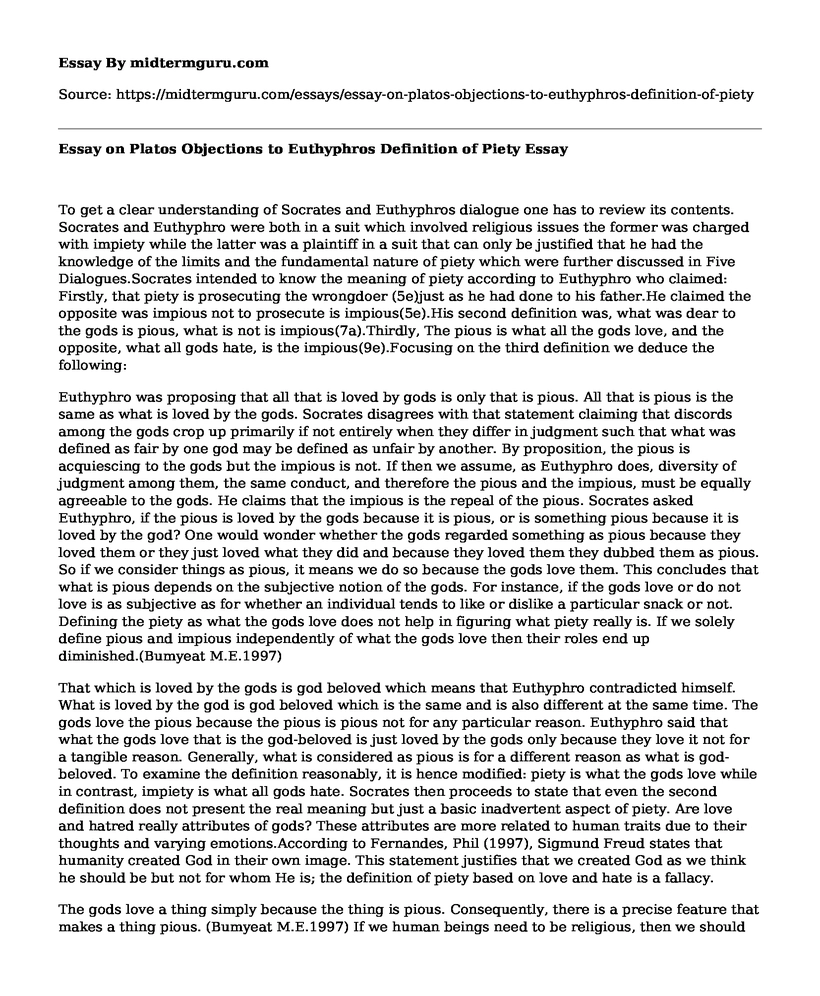To get a clear understanding of Socrates and Euthyphros dialogue one has to review its contents. Socrates and Euthyphro were both in a suit which involved religious issues the former was charged with impiety while the latter was a plaintiff in a suit that can only be justified that he had the knowledge of the limits and the fundamental nature of piety which were further discussed in Five Dialogues.Socrates intended to know the meaning of piety according to Euthyphro who claimed: Firstly, that piety is prosecuting the wrongdoer (5e)just as he had done to his father.He claimed the opposite was impious not to prosecute is impious(5e).His second definition was, what was dear to the gods is pious, what is not is impious(7a).Thirdly, The pious is what all the gods love, and the opposite, what all gods hate, is the impious(9e).Focusing on the third definition we deduce the following:
Euthyphro was proposing that all that is loved by gods is only that is pious. All that is pious is the same as what is loved by the gods. Socrates disagrees with that statement claiming that discords among the gods crop up primarily if not entirely when they differ in judgment such that what was defined as fair by one god may be defined as unfair by another. By proposition, the pious is acquiescing to the gods but the impious is not. If then we assume, as Euthyphro does, diversity of judgment among them, the same conduct, and therefore the pious and the impious, must be equally agreeable to the gods. He claims that the impious is the repeal of the pious. Socrates asked Euthyphro, if the pious is loved by the gods because it is pious, or is something pious because it is loved by the god? One would wonder whether the gods regarded something as pious because they loved them or they just loved what they did and because they loved them they dubbed them as pious. So if we consider things as pious, it means we do so because the gods love them. This concludes that what is pious depends on the subjective notion of the gods. For instance, if the gods love or do not love is as subjective as for whether an individual tends to like or dislike a particular snack or not. Defining the piety as what the gods love does not help in figuring what piety really is. If we solely define pious and impious independently of what the gods love then their roles end up diminished.(Bumyeat M.E.1997)
That which is loved by the gods is god beloved which means that Euthyphro contradicted himself. What is loved by the god is god beloved which is the same and is also different at the same time. The gods love the pious because the pious is pious not for any particular reason. Euthyphro said that what the gods love that is the god-beloved is just loved by the gods only because they love it not for a tangible reason. Generally, what is considered as pious is for a different reason as what is god-beloved. To examine the definition reasonably, it is hence modified: piety is what the gods love while in contrast, impiety is what all gods hate. Socrates then proceeds to state that even the second definition does not present the real meaning but just a basic inadvertent aspect of piety. Are love and hatred really attributes of gods? These attributes are more related to human traits due to their thoughts and varying emotions.According to Fernandes, Phil (1997), Sigmund Freud states that humanity created God in their own image. This statement justifies that we created God as we think he should be but not for whom He is; the definition of piety based on love and hate is a fallacy.
The gods love a thing simply because the thing is pious. Consequently, there is a precise feature that makes a thing pious. (Bumyeat M.E.1997) If we human beings need to be religious, then we should identify this quality and also a valid reason as to why it is worth abiding by this quality that makes us virtuous. The gods loving something makes it pious. If it is a constant factor that makes the gods love something for it to be pious, we should know, but if it is a variable factor then we should ignore as it will be the rise of disagreements among ourselves.
References.Bumyeat M.E.Ancient Philosophy 17-the Impiety of Socrates(article).Mathesis Publications, 1997 Fernandes, Phil. sAll Men Thirst For God. Institute of Biblical Defense,1997.
Mackie, J.L.1977 Ethics: Inventing Right and Wrong. New York: Penguin Books.
Plato. Five Dialogues translated by G.M.A.Grube (2nd ed.).Hackett Publishing, Inc.,2002
Cite this page
Essay on Platos Objections to Euthyphros Definition of Piety . (2021, Jun 03). Retrieved from https://midtermguru.com/essays/essay-on-platos-objections-to-euthyphros-definition-of-piety
If you are the original author of this essay and no longer wish to have it published on the midtermguru.com website, please click below to request its removal:
- How Two Different Theorists Marx and Weber Would Explain the Same Article
- Paradox of Inquiry - Paper Example
- Annotated Bibliography on Plato and Aristotle Philosophy
- Residents of Prinsloo vs Oil Refinery: An Ethical Dilemma - Essay Sample
- Virtual Ethics Philosophers - Essay Sample
- My Code of Ethics: Golden Rule & Brazen/Iron Rules - Research Paper
- Utilitarianism Case Study







